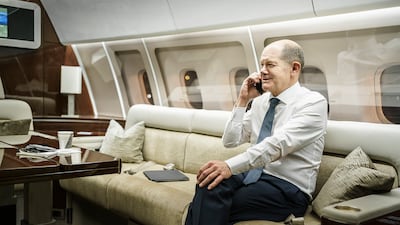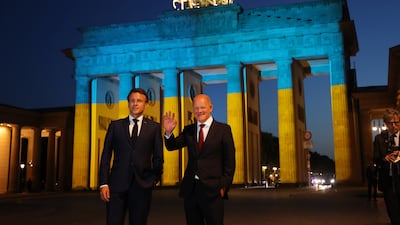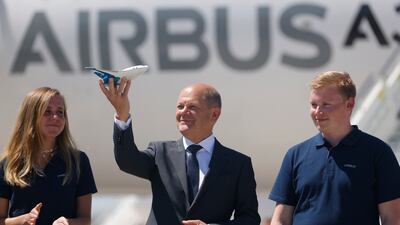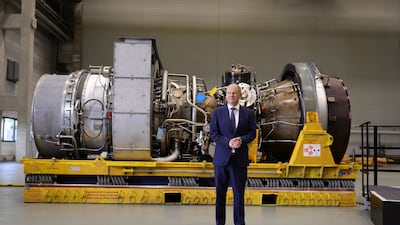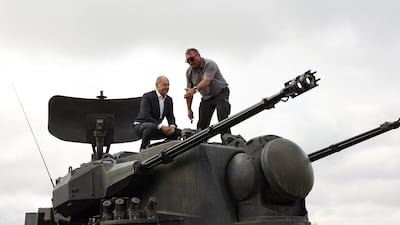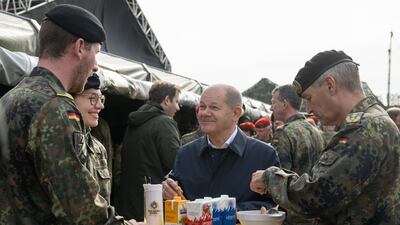Since war broke out in Ukraine, Germany has become its fourth-biggest military backer, found homes for a million refugees, and avoided a worst-case economic meltdown caused by the loss of Russian gas.
Yet the mood in Germany is far from upbeat. There is much unease at the red lines that have been crossed and reviews are mixed for Chancellor Olaf Scholz’s handling of the crisis.
Mr Scholz’s rhetoric, and that of other senior figures, suggest they realise how starkly the world has changed.
But the practical work of adapting Germany’s security policy to what Mr Scholz calls the Zeitenwende, or changing of the times, has been more difficult.
A major anti-weapons protest is expected in Berlin this weekend, with as many as 500,000 people calling for a ceasefire.
Still, the debate over tanks is not the whole story. Germany had the discipline to avert a winter of power cuts and goodwill towards Ukrainian refugees remains high.
“It is really amazing how great the stamina has been, including from many volunteers,” said Ulrich Lilie, the president of a Christian aid network.
Olaf Scholz's time in power - in pictures
History and politics
Germany’s remorse over the Second World War looms large over its approach to Ukraine, putting to the test its post-1945 credo of “never again”.
Before 2022, that meant not sending weapons to conflict zones. Now, Mr Scholz says “never again” means helping Ukraine withstand a war of aggression.
The weapons sent to Ukraine include armoured vehicles, air defence missiles, rocket launchers, anti-aircraft guns and howitzers. Only the US, UK and Poland have offered more.
It is not only Mr Scholz who has changed his stance. An establishment once captivated by the dream of a “common European home” with Russia, after Moscow cleared the way for German reunification, has had to adjust to a new world.
“A lot of policy was determined by guilt and gratitude,” said Christoph Heusgen, an adviser to former chancellor Angela Merkel who now chairs the Munich Security Conference.
But “it is because we tried everything that we have to implement this Zeitenwende”, he said. “We tried everything to make it work, and Putin trampled over all of it.”
Much has been made of Mr Scholz’s personal style, which his allies describe as calm and serious, but comes over as arrogant or indecisive to others.
Ukraine has been frustrated at the pace of his decision-making and it did not go unnoticed that President Volodymyr Zelenskyy stopped in London, Paris and Brussels, but not Berlin, on his recent European tour.
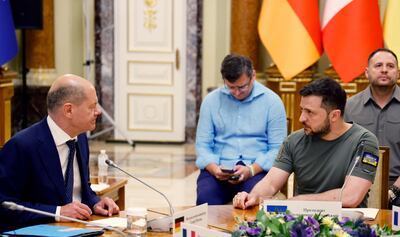
Mr Scholz struck a sombre tone when he announced, after much deliberation, that Germany would send its main Leopard battle tanks to Ukraine.
Russia swiftly accused Germany of abandoning its debt to the dead of the Second World War — a typical Kremlin deflection but one that chimed with some people’s qualms in Berlin.
One poll showed the tank shipments supported by 59 per cent of the public in the former West Germany, but opposed by 57 per cent in what was once the Soviet-backed East.
New Defence Minister Boris Pistorius signalled another shift last weekend by saying in Munich that “Ukraine must win”, a statement from which Mr Scholz and others have shied away.
A €100 billion ($106.5 billion) upgrade of the German military is meant to end the equipment problems that have plagued the armed forces but it is proving a slow process.
Faults with German Puma tanks allocated to a Nato rapid-response unit meant they had to be replaced at the 11th hour and shortages have limited the scope of support to Ukraine.
Sir Adam Thomson, a former British ambassador to Nato, said Germany was one of several countries that had undergone a “huge shift in thinking” since the invasion.
“Maybe Germans don’t yet know what Zeitenwende means but at least it has been uttered and they’re working on it,” he said.
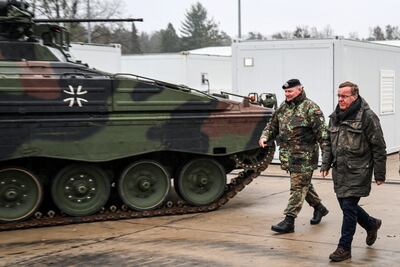
Energy overhaul
Mr Scholz has called for these delays to be replaced with a “new German speed”, modelled on its rapid move away from Russian energy, in which a new North Sea gas terminal was completed in only 194 days.
Before the war, Germany imported 55 per cent of its gas from Russia and was in danger of becoming ever more reliant as it moved away from coal and nuclear power.
Now, there is no Russian gas from the damaged Nord Stream pipelines, but mild weather, alternative suppliers and a public energy-saving campaign have helped Germany avoid winter power cuts.
The expansion of a coal mine, and an extension for Germany’s last three nuclear plants to cover the country’s energy needs, have been difficult pills for the Greens in Mr Scholz’s coalition to swallow.
However, the German economy grew by 1.9 per cent last year and a winter recession is expected to be shorter and milder than once feared.
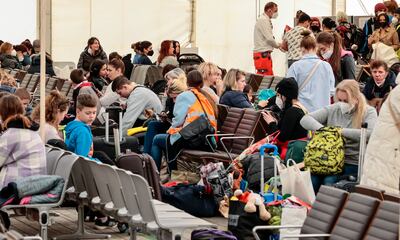
The economy has also been helped by an estimated 65,000 Ukrainian refugees taking jobs in Germany, helping to ease labour shortages.
After all the rancour that came with the Syrian migrant crisis in 2015, the consensus is that Germany has absorbed Ukrainian refugees as smoothly as could be hoped.
More than a million Ukrainians were registered in Germany during 2022, most of them women and children, and many Germans went to airports and train stations to offer help.
Mr Lilie, the Christian aid boss, said fears the hard winter would sap Germany’s goodwill towards Ukrainians had not come to pass.
However, he said more support was needed for people who had offered their homes to Ukrainians.
“We are noticing signs of fatigue,” he said. "Many people put up accommodation and said ‘sure thing, I’ll do it for a couple of months. Now it’s turned into a year.”




